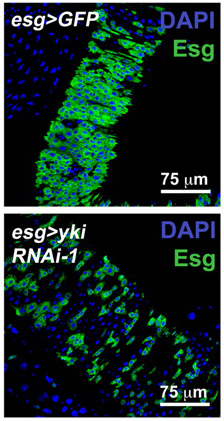Intestinal stem cell regeneration
Posted by Erin M Campbell, on 5 January 2011
 Cancer and stem cells are two very loaded biology concepts, and more frequently can be found in the same discussion. Stem cells within tumors are able to divide and provide the various differentiated cell types that a tumor requires to thrive. And, identifying how a normal stem cell divides, or stops dividing, can help further the understanding of tumorigenesis. Along these lines, a paper from the December 15 issue of Development describes a pathway involved in intestinal stem cell proliferation.
Cancer and stem cells are two very loaded biology concepts, and more frequently can be found in the same discussion. Stem cells within tumors are able to divide and provide the various differentiated cell types that a tumor requires to thrive. And, identifying how a normal stem cell divides, or stops dividing, can help further the understanding of tumorigenesis. Along these lines, a paper from the December 15 issue of Development describes a pathway involved in intestinal stem cell proliferation.
Intestinal stem cells (ISCs) normally divide to replace differentiated intestinal cells at a rate that supports tissue homeostasis. This rate of ISC division quickly increases when intestinal cells suffer injury due to damage, disease, or exposure to pathogens or chemical agents. Recently, Karpowicz and colleagues investigated this switch from normal to “acute regeneration” of intestinal cells in Drosophila midgut epithelium, a great model for ISC self-renewal. In this paper, the authors find that ISC proliferation is constitutively controlled by Hippo, a member of a pathway involved in organ growth and cancer. In addition, injury disrupts this regulation of Hippo, which in turn activates Yorkie, a Hippo pathway target. The authors find that this cell-autonomous role for the Hippo pathway is crucial for regulation of ISC proliferation.
Images above show regions of control (top) and Yorkie-depleted (bottom) Drosophila midgut tissue. Yorkie depletion causes fewer ISC divisions, as seen as fewer cells positive for Escargot (Esg; green), a known transcription factor expressed in ISCs.
For a more general description of this image, see my post on EuroStemCell, the European stem cell portal.
![]() Karpowicz, P., Perez, J., & Perrimon, N. (2010). The Hippo tumor suppressor pathway regulates intestinal stem cell regeneration Development, 137 (24), 4135-4145 DOI: 10.1242/dev.060483
Karpowicz, P., Perez, J., & Perrimon, N. (2010). The Hippo tumor suppressor pathway regulates intestinal stem cell regeneration Development, 137 (24), 4135-4145 DOI: 10.1242/dev.060483


 (5 votes)
(5 votes)
Huh…I never even thought of a stem cell becoming a cancer cell. Does the immune system which regularly destroys damaged cells some of which are cancer cells not have, or have a reduced capacity to, deal with cancerous stem cells?
Nathan – There is so much work getting churned out about stem cells and cancer, so if the answer to your question isn’t out there yet, there are plenty of smart folks figuring it out. I think the immune system can target some cancerous cells (although I’m not sure about tumor stem cells), but coincidentally my next post on HighMag is about a paper showing leukocytes supporting early transformed cells, not disrupting their growth. The story isn’t straightforward…that’s why the Perrimon lab paper on this post is so important. Showing how normal stem cells switch to more or less proliferation is a great step.